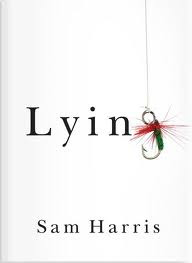 |
| Amazon |
 |
What was so fascinating about this seminar, however, was how difficult it was to find examples of virtuous lies that could withstand Professor Howard's scrutiny. Even with Nazis at the door and Anne Frank in the attic, Howard always seemed to find truths worth telling and paths to even greater catastrophe that could be opened by lying."
After the jump, my review.
Grade: C-
In this short book (a Kindle Single), Sam Harris explores the notion of lying. He's against it. He's against even innocent little white lies, which may be told out of kindness but do not really do a service to others. He argues that lying can cause unintended, undesired consequences worse than any momentary social embarrassment caused by simply telling the truth. He argues that lying as a habit is difficult for the liar, who has to remember his lies so as not to be caught out later with a slip of the tongue.
Harris runs through all the hypothetical situations where people might be justify telling a lie ("Do I look fat in this?", "Do you still love me?", "Is Anne Frank hiding in your attic?", etc.) and the only one where he finds an argument to justify lying is in the case of war. "But war and espionage are conditions in which human relationships have broken down or were never established in the first place; thus the usual rules of cooperation no longer apply."
Like in his book Free Will, Harris writes clearly, objectively, straightforwardly. I give it a so-so grade not because he fails in any of those writing goals, but because I hoped for new ideas on the subject. Harris' short book lays out an argument that is simple and compelling but is unlikely to change anyone's behavior (like advice to eat right and get more exercise). But if you have been burned by a habit of telling white lies to avoid hurting people's feelings, then this is the book for you. It's perfect for making New Year's resolutions.
Excerpts:
"I came away convinced that lying, even about the smallest matters, needlessly damages personal relationships and public trust."
"Children do not learn to tell white lies until around the age of four, after they have achieved a hard-won awareness of the mental states of others."
"An unhappy truth of human psychology is probably also at work here, which makes it hard to abolish lies once they have escaped into the world: We seem to be predisposed to remember statements as true even after they have been disconfirmed."
"Big lies have led many people to reflexively distrust those in positions of authority. As a consequence, it is now impossible to say anything of substance on climate change, environmental pollution, human nutrition, economic policy, foreign conflicts, pharmaceuticals, and dozens of other subjects without a significant percentage of one's audience expressing paralyzing doubts about even the most reputable sources of information. Our public discourse appears permanently riven by conspiracy theories."
"The lies of the powerful lead us to distrust governments and corporations. The lies of the weak make us callous toward the suffering of others. The lies of conspiracy theorists raise doubts about the honesty of whistleblowers, even when they are telling the truth. Lies are the social equivalent of toxic waste -- everyone is potentially harmed by their spread."

No comments:
Post a Comment
Keep it courteous, clean, and on topic.
Include your name.
Anonymous commenters are unwelcome.